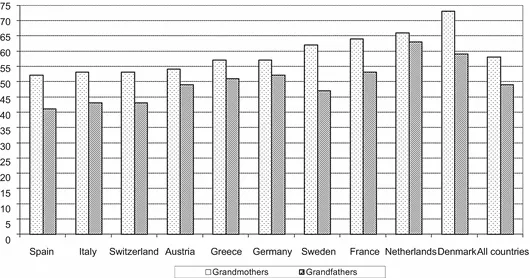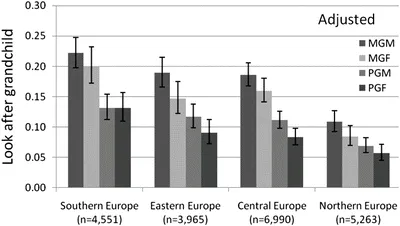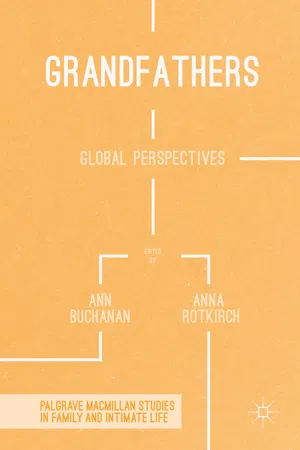Making Grandfathers Visible
Just as older men are invisible in the academic literature (Thompson
1994), grandfathers are even more so. Although in the last 20 years there has been a burgeoning of books and journal articles on grandparents and their role in family life, on close inspection most of these relate to grandmothers. Where grandfathers are mentioned, it is as a ‘deficit’ model, that is, compared to grandmothers they are less involved with, and less committed to, their grandchildren (Mann
2007). However, these differences can be very small. Thus, in a recent study of grandparenting across Europe (Glaser et al.
2014), it was noted that whereas 44 % of grandmothers gave regular or occasional help looking after grandchildren, 42 % of grandfathers played a similar role. In Europe in 2004, one in two grandfathers provided any child care in the last 12 months; in France, the Netherlands and Denmark, they were even more active than that. In Italy and Greece, one-third of grandfathers provided grandchild care weekly or more often (Hank and Buber
2007) (Fig.
1.1).
Many of these European grandfathers will be involved in joint care with grandmothers, but nevertheless their contribution is substantial. A study by Grandparents Plus and Age UK suggests that the informal care offered by grandparents in the UK is worth £7.3 billion a year (Grandparents Plus 2014).
There is wide diversity in grandparenting across individuals, communities and ethnic groups, as well as across historical time (Bengtson and Robertson 1985). There are also similarities in the roles grandfathers play in different contexts and societies.
Never before in human history have so many men lived to be grandfathers in relatively good health, having thereby the time and energy to devote to the next generation. The expanding roles of masculine behaviour are also broadening the role of what a grandfather can do. In traditional societies, grandfathers are often seen as the head of the male lineage, a figure of authority and a transmitter of cultural values. This is now being complemented by the image of the grandfather as a softer and more caring figure. In Europe today, one trend is for ‘new’ grandfathers to emerge, similar to the appearance of ‘new’ fathers in the 1960s and 1970s.
The male caretaker may also have full responsibility of a small child, engaging in care work and physical play, not merely a ‘helper’ to his female partner. Such new grandfathers may be men who feel they missed out spending time with their own children and find it meaningful to care for their grandchildren (Mann and Leeson 2010). Increasingly often, they are also men who cared for their own children and who find it natural to continue being a caring male for their grandchildren.
This book brings together evidence from around the world, from different disciplines and from different types of research, to give a comprehensive account of grandfather studies. We are interested in the changing roles and expectations of grandfathers, and especially in grandpaternal involvement with children and the impact of this involvement both on grandchildren and on the grandfathers’ own health and well-being. Grandparenting is part of human existence and appears in all societies, providing an often substantial part of the extended caregiving that helps parents feed and raise their children. Much in grandparenting is similar for both men and women, and many aspects of grandparenting are influenced by the spouse; here, we focus on the experience and behaviour of men who have grandchildren, studying them in tandem with their partners or independently. We aim to make visible the grandparent who has typically remained in the shadows.
Global Families
Throughout the world, grandparents share many of the tasks of family life in raising the next generation, taking care of babies and children, providing education and transmitting culture, and helping the nuclear family with practical and financial support. How grandparents, including grandfathers, operate and the values they espouse also vary among the major family systems.
In most of the world and throughout history, the male family line has dominated with regard to residence and to financial and cultural inheritance (e.g. land ownership, family surnames). Daughters have married out whilst sons have stayed in the family, often living together as large extended families headed by the paternal grandfather. Of the major family systems as distinguished by sociologist Göran Therborn (2004), it is especially the highly patriarchal East Asian family system that emphasizes the father–son relationship over all other family bonds. Other Asian family systems and the sub-Saharan family type are also mostly patriarchal and patrilineal, again placing the paternal grandfather in a central position.
In Europe, especially Northern and Western Europe, patriarchy was dismantled earlier, nuclear households were more common as opposed to multigenerational ones and marital dispersion patterns were more varied so that parents could live close to either paternal or maternal grandparents (Therborn 2006).
Whenever women can choose, they usually favour keeping close to their own parents after marriage, not least for purposes of getting help with child care. Also, economic poverty or major upheavals, such as wars and epidemics, tend to loosen up the patriarchal family, activating both sets of grandparents depending on who is available. For instance, the HIV/AIDS epidemic in Africa has orphaned many children, who are now raised by their grandparents.
In these various cases, the maternal grandfather emerges as an important family member alongside the traditionally dominating paternal grandfather. Thus, throughout today’s Europe, maternal grandparents provide, on average, more child care than do paternal grandparents. There is also a gender difference, since grandmothers on average provide more care than grandfathers. However, lineage differences often override the gendered division of caring. Based on data from the Survey of Health, Ageing and Retirement in Europe, maternal grandfathers provide care to grandchildren somewhat more than paternal grandmothers and clearly more than paternal grandfathers (Hank and Buber
2007; Danielsbacka et al.
2015). This preference for the maternal lineage is partly, but not fully, explained by greater emotional closeness between the child’s parents and maternal grandparents (Danielsbacka et al.
2015) (Fig.
1.2).
Cultural expectations of grandparents vary significantly. At one extreme are the Western individualistic cultures, where the stress is on self-reliance, decision-making based on individual needs, and the right to a private life (Triandis et al. 1988). Here the role of the grandparent is seen as lying outside the immediate family. At the other extreme are the East Asian patriarchal collectivist cultures, in which absolute loyalty is expected to one’s immediate and extended family and ethnic group. Decision-making processes emphasise the needs of the family and kin group first. In Confucian families (Chap. 7), individual needs are supposed to be subsumed under those of the family.
Countries also vary in how much grandparents are seen as being part of everyday family life. In the developing world, the most usual household model is the extended family, in which generations live together and share the household tasks and responsibilities. In Western countries, the dominant model is the nuclear family, in which the parents of one generation live apart from their own parents in their own household. Only the parents of dependent children are recognised both by society and in law as those kin responsible for the care and well-being of their young.
However, in recent years, with populations becoming more diverse in the USA, UK, and Australia, the number of three-generation families has increased. During early childhood, for example, nearly one-quarter of US children live in a three-generation household (Pilkauskas and Martinson 2014). Here the role of the grandparent, and in particular the grandfather, may be more important than in nuclear families. Also, within Europe, the Southern and Central regions, with more conservative family values, tend to have more intensive involvement from grandparents (e.g. Jappens and Van Bavel 2012).
Demographic Trends Increase Grandfather Availability
Whether grandfathers can play a role with their grandchildren of course depends on whether they survive long enough, and are healthy enough, to see their grandchildren grow up. Changing demography is partly responsible for the new importance attached to grandfathers.
Never before have there been so many older people. The United Nations (UN) report that population ageing is unprecedented in human history. By 2050, the n...








